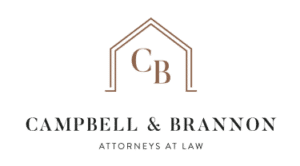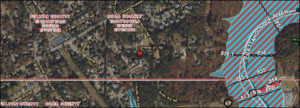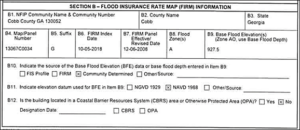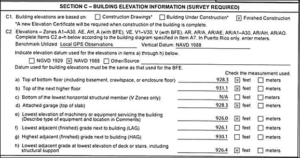11.11.2020
ONE OF A SERIES OF 30 MINUTE TOPICS THAT GET RIGHT TO THE POINT
Flood Zones

Flood Zones, Flood Plains and Elevation Certificates
Metro Atlanta is situated among the foothills of the Appalachian Mountains. At 1,050 feet (320 m) above mean sea level, Atlanta has one of the highest elevations among major cities east of the Mississippi River.
Elevation: 738 to 1,050 ft (225 to 320 m)
Despite the high elevation, we must still contend with flooding in areas where properties abut bodies of water, most commonly rivers, streams, and lakes. This quick topic will discuss how to approach this issue and prepare you with the basic tools for advising your clients on next steps.
The National Flood Insurance Program (NFIP) is managed by the Federal Emergency Management Agency and is delivered to the public by a network of approximately 60 insurance companies and the NFIP Direct.
Floods can happen anywhere — just one inch of floodwater can cause up to $25,000 in damage. Most homeowner’s insurance does not cover flood damage. Flood insurance is a separate policy that can cover buildings, the contents in a building, or both, so it is important to protect your most important financial assets — your home, your business, your possessions.
The NFIP provides flood insurance to property owners, renters and businesses, and having this coverage helps them recover faster when floodwaters recede. The NFIP also encourages communities to adopt and enforce floodplain management regulations that help mitigate the effects of flooding.
Flood insurance is available to anyone living in one of the 23,000 participating NFIP communities. Homes and businesses in high-risk flood areas with mortgages from government-backed lenders are required to have flood insurance.
REMEMBER: Many people don’t understand just how risky the floodplain can be. There is a greater than 26% chance that a non-elevated home in the Special Flood Hazard Area (“SFHA”) will be flooded during a 30-year mortgage period.
The chance that a major fire will occur during the same period is less than 10%!
See below for more:



Question: Do you need flood insurance??
IT DEPENDS!
I would recommend to a buyer in this situation to get flood insurance to insure against possible damage to the foundation (i.e. settling). The cost is likely minimal in this situation, but it would vary based on the facts.
The lender may also require flood insurance, though again it depends. I have seen where a Lender might not require it if the Buyer would not otherwise be approved for the loan due to the cost – be careful!